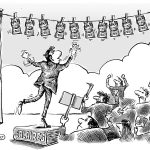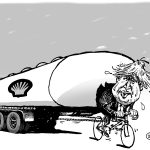France joins the Club Med
The COVID crisis has definitely pushed France into the “Club Med” countries. At the risk of triggering a new euro crisis?
In 2020, France, together with Spain, Cyprus and Belgium, joined The “Club Med” of European countries that exceed the threshold of 100% public debt to their GDP. This club already included Greece, Italy and Portugal.
Beyond a nickname that economists are often fond of, the observation is damning. The report by the French Court of Auditors on the dynamics of public spending in France and that by the Tirole/Blanchard Commission on ‘The major economic challenges’, published almost simultaneously, paint a picture of a France mired in decades old difficulties and looking for ways to implement more or less the decades-old and too well-known solutions involving decisions – unfortunately always postponed – that are increasingly difficult to take.
From 2000 to 2019, the weight of public spending increased from 51.7% of the GDP to 55.4%.
The lastest rerport from the Court of Auditors reminds us of the harsh reality of the growth of public spending, notwithstanding the COVID-19 crisis, which would in this instance, be almost a good excuse. From 2000 to 2019, the weight of public spending rose from 51.7% of the GDP to 55.4%. This is in stark contrast to the euro area average, where spending has remained almost stable, and has even fallen in some countries such as Germany. The French singularity is less in the items of expenditure in question than in their speed of growth (much higher than its main partners, including during the Covid crisis). Let us remember that Italy, faced with the burden of a large debt, has made structural efforts that France has not been able to implement during these years.
As far as the report is related, it would probably be unfair to go back once again to the quasi-mythical Rueff-Armand report of 19591. At least we can take note of the 316 proposals of the Attali Commission, of 20082, which already highlighted the challenges of inequalities, the weight of public spending, competition and the challenge of the modernization of the economy.
The 2021 Tirole/Blanchard report3 can only return to these issues, only more specifically focused on the issue of climate change, inequality and ageing. In addition to the fact that the Commission is distinguished by the international composition of its committee, it was not fail to note that the main proposals (carbon tax, pension reform, inheritance taxes) are among the most contested in France. It is true that these are fundamental measures, but the Commission itself admits being extremely unpopular.
The temporary suspension of the Maastricht rules should pave the way for new ways of assessing budgetary and debt convergence.
As France approaches the “Great Loop” that will lead it to the Presidential election next April 2022, what else can the government do? Is there a risk of a clash, perhaps even a European crash by then? In the face of the pandemic, the state of economic emergency still persists. The temporary suspension of the Maastricht rules promises to be lasting and should pave the way for new methods of assessing budgetary and debt convergence. France, whose €100 billion fiscal stimulus package has been endorsed by the European Commission, is campaigning for the abandonment of the Maastricht rules and the implementation of new multi-year standards, based on the stabilisation – or even the reduction – of public debt.
To consider that the criteria that one no longer respects oneself hold no value will be enough to irritate not only the so-called ‘frugal’ countries of the European Union, but also those which, since the 2008 crisis, have made significant efforts to comply with common standards and to honour their commitments. Could the recovery in inflation – a threat still far away in the eurozone compared to the US – take the ECB at odds? Is France in danger, through its lack of discipline, of giving new arguments to the critics of an economic and monetary zone, considered suboptimal? The paradox is striking (almost ironic): on the one hand, the recent European Commission’s bond issue has met with great success among investors and has consolidated the euro in its international dimension; on the other hand, its integrity and unity seem to be directly threatened from within by centrifugal economic and budgetary forces that risk eventually leading to a new period of monetary and bond tensions, forcing France to make adjustments all the more drastic as it would no longer have control over them.
If repetitive pedagogy can have its merits, it must still lead to some concrete results.
1 «Rapport sur les obstacles à l’expansion économique» Jacques Rueff, Louis Armand November 1959, https://www.vie-publique.fr/sites/default/files/rapport/pdf/074000508.pdf
2 «Rapport pour la libération de la croissance française», Jacques Attali, January 2008 https://www.vie-publique.fr/sites/default/files/rapport/pdf/084000041.pdf
3 Report ” Les grands défis économiques” chaired by Jean Tirole and Olivier Blanchard, June 2021 https://www.strategie.gouv.fr/sites/strategie.gouv.fr/files/atoms/files/fs-2021-rapport-les_grands_defis_economiques-juin_0.pdf
Original article in Allnews.ch dated 29 jun. Cartoon by © Barret



